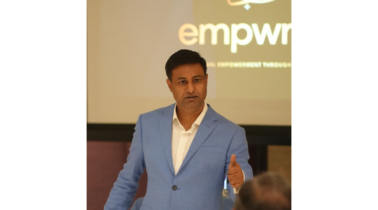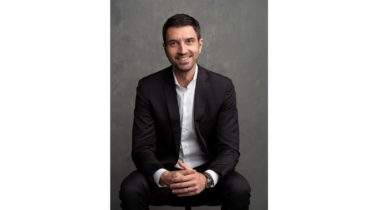Pioneering Digital Excellence across Different Cultures: Insights from Naohiro Yamaura , COO of Ayudante, Inc.
Blending diverse corporate cultures and steering a company towards significant growth requires exceptional leadership and cultural intelligence. Mr Naohiro Yamaura, COO and Chief Executive Consultant of Ayudante, Inc., and an alumnus of the NUS Executive MBA (Class of 2024), exemplifies this sensitivity and leadership. Ayudante, a leading provider of digital marketing solutions centred on Google’s platform, specialises in website and campaign data measurement, online advertising campaigns, SEO and digital marketing strategy consulting. In June 2024, Ayudante has recently acquired Sparkline in Southeast Asia, bolstering its regional expansion. Sparkline is a data marketing firm that offers analysis, training, and consulting services for businesses.
With over 20 years of experience in the advertising and marketing industry, Yamaura combines his extensive expertise with the strategic insights gained from his EMBA to steer the next chapter for Ayudante forward.
We spoke with Yamaura about his leadership philosophy, the challenges and successes of integrating Sparkline, and the role of the NUS EMBA in his professional journey.
Navigating Integration Challenges
It must be challenging to combine two different companies, and we asked Yamaura for his insight. He agrees that integrating Sparkline into Ayudante’s operations presented multifaceted challenges, particularly in aligning two distinct corporate cultures and operational methodologies from different markets: Singapore and Japan.”Sparkline adopted a dynamic and innovative approach suitable for the aggressive Southeast Asian market, whereas Ayudante had found success with a traditional and conservative approach in the Japanese market.” Yamaura notes.
Despite these differences, both companies are committed to thoroughly supporting customers through skilled technicians and consultants. “We were confident that the integration would succeed because both companies shared a common DNA,” explains Yamaura. The successful integration of Sparkline’s advanced technical expertise with Ayudante’s established customer base in Japan has allowed the company to expand its knowledge and service levels, increasing its reach in the APAC market. Transparent communication, a shared high-value proposition, and regular personnel exchanges between Singapore and Japan have been instrumental in maintaining team motivation and accelerating the integration process. With Yamaura leading Sparkline’s board, the combined strengths of both companies are set to enhance their presence in the APAC market while maintaining their respective brands.
Leadership Approach and Positive Work Culture
Part of this successful integration is the way Yamaura leads his team. He says of his approach, “To create a positive culture in a tech-focused workplace, it is crucial to recognise and respect individual abilities and promote a high level of work-life balance.” Yamaura’s approach to leadership emphasises advocating for the company’s value proposition, fostering empathy, and respecting each team member’s skills and methods.
We ask for his leadership tips, and he generously shares one practice he does regularly. He makes time to understand their aspirations and challenges through scheduled one-on-one meetings with team members, providing tailored support to align their goals with the company’s objectives. Another practice he implemented is a recognition program where outstanding contributions are publicly acknowledged, fostering a sense of appreciation and motivation. For him, leadership is about finding opportunities to align team members’ self-fulfillment with their customer contributions and drive the company’s growth. His leadership practices are also deeply influenced by what he learned from the NUS Executive MBA program, which he credits for enhancing his ability to lead effectively in a diverse and complex market.
The Role of the NUS Executive MBA
If you’re wondering how the NUS EMBA can help you bridge connections outside your home country, Yamaura’s experience is especially enlightening. “I participated in the NUS EMBA to expand my business into Singapore,” Yamaura shares. An advanced degree like the NUS Executive MBA is crucial for professionals aiming to advance their careers, especially in leadership roles. The NUS EMBA provides a global perspective, strategic thinking, and leadership skills. Exposure to diverse cultures and business practices at NUS has been incredibly valuable for navigating the interconnected and diverse Southeast Asian market. The program enhances leadership abilities, expands professional networks, and provides the knowledge needed to tackle complex business challenges in the APAC region.
Yamaura feels that the EMBA fosters an understanding of diversity, encourages innovation, and develops the ability to effectively lead organisations through change and growth. He candidly states, “For someone like me, who has grown up in the Japanese market, the NUS EMBA was crucial not only in enhancing my leadership abilities but also in expanding my professional network and gaining the knowledge needed to navigate the complex business challenges of the APAC region.”
Business talks aside, what was his favourite part of the program? He says it involves group work with peers from various specialised fields. “Amidst a demanding schedule, I immersed myself in group work, dedicating time to multiple projects, including developing a comprehensive business strategy for a real-world company,” he recalls. These intense, time-constrained discussions facilitated focused debates and collective problem-solving within a highly collaborative team environment. The trust built in such an environment has become a lifelong asset, continuing well beyond graduation.
Advice for Aspiring Leaders
For aspiring leaders considering the EMBA program, Yamaura offers one quick tip: open your mind and fully immerse yourself in the experience. “Trust the journey and embrace the program wholeheartedly,” he advises. Your leadership skills will be honed by being eager to learn from every experience and interaction.
Engaging with peers, professors, and the broader EMBA community is crucial. “Through the EMBA, I successfully acquired a company and relocated to Singapore,” he shares, underscoring how the program can shape career pathways. He adds that many classmates have embarked on new challenges and succeeded, highlighting the program’s broad impact on career advancement and personal growth. Therefore, for potential candidates reading this, Yamura’s useful advice shows that the NUS EMBA program can open multiple doors for your career and personal growth. With this in mind, it might be the perfect time to leap into achieving your professional aspirations by joining us at the NUS EMBA program.
Q and A with Yamura
- Can you share some key challenges and successes you experienced while integrating Sparkline into Ayudante’s operations? How did you ensure a smooth and successful transition for both teams?
Integrating Sparkline into Ayudante;s operations presented multifaceted challenges. One significant challenge was aligning the two distinct corporate cultures and operational methodologies that had evolved in different markets, Singapore and Japan. Sparkline adopted a dynamic and innovative approach suitable for the aggressive Southeast Asian market, whereas Ayudante had found success with a traditional and conservative approach in the Japanese market. However, we were confident that the integration would succeed
because both companies shared a common DNA: a commitment to thoroughly supporting our customers through skilled technicians and consultants.
While we are still at the starting point, we have successfully integrated Sparkline’s advanced technical expertise with Ayudante’s established customer base in Japan. This seamless integration has allowed us to expand our knowledge and service levels, increasing our reach in the APAC market. We maintained transparent communication and set a high-value proposition derived from our shared DNA to ensure a smooth transition.
Regular personnel exchanges between Singapore and Japan have been instrumental in maintaining team motivation and accelerating the integration process.
- What is your approach to leadership, and how do you create a positive work culture? Can you share some specific practices you use?
Coach to leadership involves constantly advocating for our value proposition, fostering empathy, and respecting each team member’s skills and methods. One specific practice I employ is regular one-on-one meetings with team members to understand their aspirations and challenges, and to provide appropriate feedback. This helps tailor support to their individual needs and align their goals with our value proposition. To create a positive culture in a tech-focused workplace, it is crucial to recognize and respect individual abilities and promote a high level of work-life balance. I have established
a recognition program where outstanding contributions are publicly acknowledged, fostering a sense of appreciation and motivation. The self-fulfillment of team members aligns with their contributions to customers, driving the company’s growth.
- How do you think an advanced degree like NUS Executive MBA can help professionals advance their careers, especially in leadership roles like yours?
An advanced degree like the NUS Executive MBA provides professionals with a global perspective, strategic thinking, and leadership skills. I participated in the NUS EMBA with the goal of expanding my business into Singapore. At NUS, I was exposed to diverse cultures and business practices, which is incredibly valuable in the interconnected and diverse Southeast Asian market I am venturing into.
For someone like me, who has grown up in the Japanese market, the NUS EMBA was crucial not only in enhancing my leadership abilities but also in expanding my professional network and gaining the knowledge needed to navigate the complex business challenges of the APAC region. The EMBA fosters an understanding of diversity, encourages innovation, and develops the ability to lead organizations through change and growth effectively.
- What is one favourite moment during your EMBA studies, and why did it stand out to you?
One of my favorite moments during the EMBA program coincides with one of the most challenging experiences. Amidst a demanding schedule, I immersed myself in group work with peers from various specialized fields, dedicating time to multiple projects. One such project required us to develop a comprehensive business strategy for a real-world company. It was during these intense, time-constrained discussions that we were able to engage in focused debates and collective problem-solving within a highly collaborative team environment.
This experience was incredibly fulfilling, and the trust built in such an environment has become a lifelong asset, continuing well beyond graduation.
- Can you share one quick tip for aspiring leaders considering participating in the EMBA program?
One quick tip for aspiring leaders is to open your mind and fully immerse yourself in the NUS EMBA program. Trust the journey and embrace the program wholeheartedly. Through the EMBA, I successfully acquired a company and relocated to Singapore. Many of my classmates have also embarked on new challenges and achieved success.
By being eager to learn from every experience and interaction, your leadership skills will be honed. Actively engage with your peers, professors, and the broader community, and you will be guided to become a leader in Asia.


